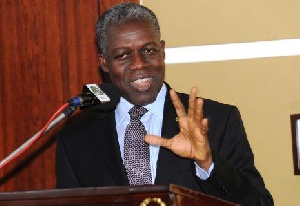Vice-President Kwesi Bekoe Amissah-Arthur has assured Ghanaians of the effective management of the nation's oil proceeds and tasked the media and civil society to continue to hold the government accountable to facilitate transparency.
He said the proceeds would be fairly distributed, and other related matters effectively handled for the oil exploitation to become a blessing rather than a curse.
In a panel discussion on resource wealth management at the World Economic Forum on Africa 2013 underway in Cape Town, South Africa, the Vice-President said the government had put in place the necessary legislative framework for the effective management of oil resources.
Ghana discovered oil in commercial quantities in 2007 and actual production began in 2011, but fears are that oil resources, if not well handled, will turn out to affect the people negatively through unfair distribution of benefits and the attendant social and environmental problems.
On the panel were Mr Aigboje Aig-Imoukhuede, Chief Executive Officer, Access Bank Plc; Ms Winnie Byanyima, Executive Director of Oxfam International UK; Mr Ricardo Saad, Global Director, Capital Projects, Africa, Asia and Australia; and Mr Andrew Wales, Senior Vice President, Sustainable Development, SABMiller, UK, representing the banking and the financial sectors, industry and civil society.
The Vice-President represented government on the panel.
The spotlight fell on Ghana, and the Vice-President took the opportunity to explain that Ghana had learnt lessons from other countries and put in place measures to ensure domestic participation, prevent over-reliance on oil to the neglect of agriculture, which is the mainstay of the Ghanaian economy, protect the environment and avoid other problems.
Mr Amissah-Arthur told the panellists that Ghana had placed a premium on domestic participation in the oil industry, hence the 10 per cent stake to Ghanaians.
He said the government was also working on the development of local content in the industry.
The government had created Stabilisation and Heritage funds, as well as a fund for agriculture and food supply support programmes and introduced a public interest accountability committee to make an in-depth assessment of the receipts and management of the oil proceeds.
Vice-President Amissah-Arthur, an economist, expressed the need for nations to ensure growth of their economies.
The panellists commended Ghana for sound legislation in the oil industry and stressed the need for the enforcement of the laws to make oil really a blessing.
Ms Byanyima said Ghana was getting it right by instituting structures for the oil sector.
Business News of Monday, 13 May 2013
Source: GNA

















